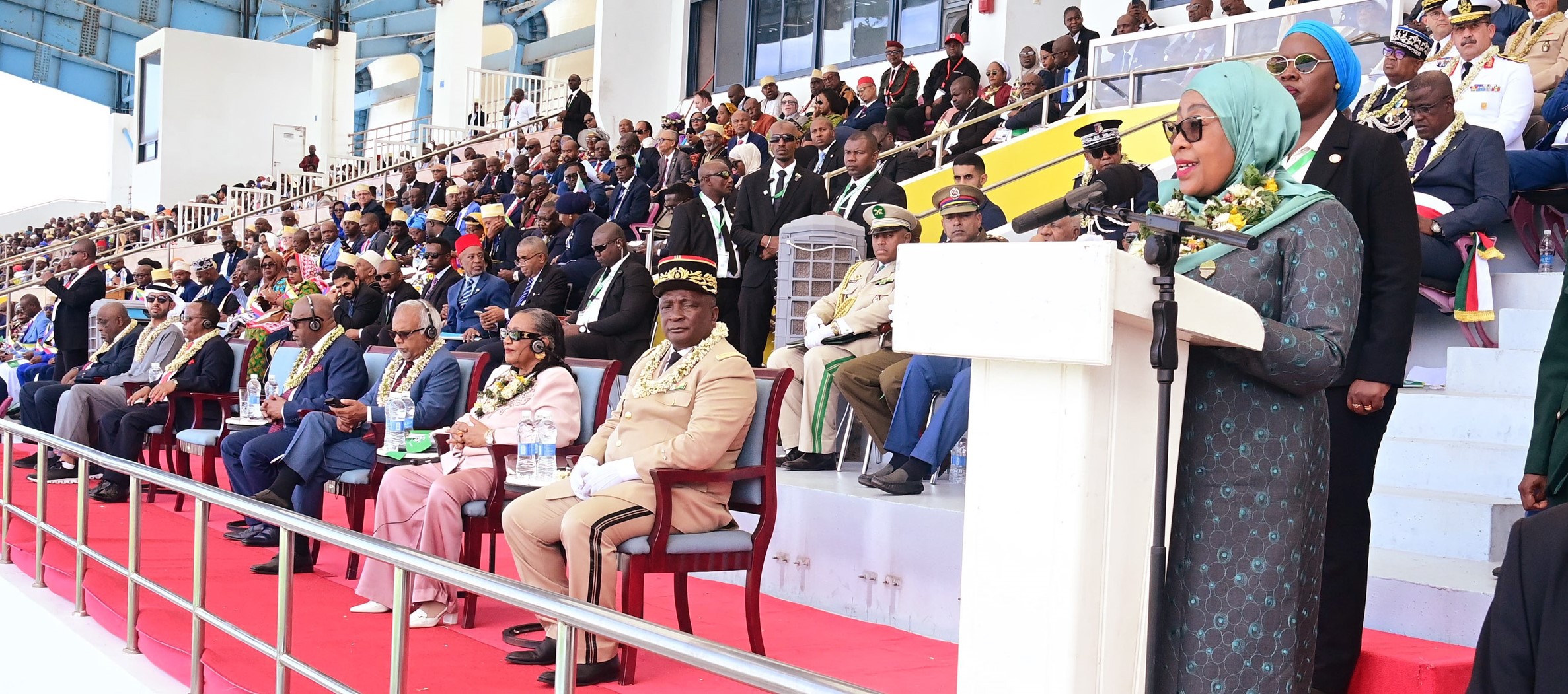Samia restates economic message as Comoros marks 50 years of independence

President Samia Suluhu Hassan speaks during the Comoros' 50th independence anniversary celebrations in Moroni on July 6, 2025. PHOTO | STATE HOUSE
What you need to know:
- Tanzanian President tells Comorians that true sovereignty can only be achieved when African nations build self-reliant economies that serve their people
Dar es Salaam. President Samia Suluhu Hassan has renewed her call for Africa to shift its focus from political liberation to full economic independence, telling Comorians that true sovereignty can only be achieved when African nations build self-reliant economies that serve their people.
Speaking as guest of honour during the Comoros’ 50th independence anniversary celebrations in Moroni on Sunday, President Hassan said the golden jubilee was not just a moment of national pride for the Comoros, but a continental reminder that the fight for economic self-determination remains unfinished.
“This day is not important to you alone, but also to us in Tanzania because Africa is one family. Your independence is our independence.”
While acknowledging the progress the Comoros has made since gaining independence in 1975, President Hassan stressed that economic liberation must now take centre stage.
“Today, as we celebrate 50 years of political independence, the major challenge ahead is economic freedom—building a self-reliant nation. This is the Africa we want: built by its people, using its own resources,” she said.
The Tanzanian Head of State’s message in the Comoros echoed remarks she made less than two weeks earlier in Maputo, Mozambique, where she also officiated as guest of honour during that country’s 50th independence anniversary.
In her June 25 speech in Maputo, President Hassan declared: “Africa has made commendable strides in achieving political independence, but we cannot stop there. We must ensure our nations are at peace and united so we can collectively pursue the second phase of transformation: the fight for economic freedom.”
By repeating the theme in the Comoros, President Hassan underlined her growing insistence that Africa’s post-colonial struggle must now evolve into economic self-rule, powered by trade, innovation, and the mobilisation of domestic resources.
Commenting on the President’s speech, an economist and lecturer at Saint Augustine University of Tanzania, Dr Isac Safari, said her back-to-back emphasis on economic independence in both Mozambique and the Comoros reflects a growing urgency among African leaders to confront the structural economic legacy of colonialism.
“She is placing a mirror before the continent. Her call for economic sovereignty is a reminder that political flags and national anthems mean little if Africa continues to be trapped in extractive economic models, aid dependency, and debt cycles,” Dr Safari said.
An economist from the University of Dodoma, Dr Mwinuka Lutengano, said “By connecting past liberation struggles with today’s economic challenges, she’s offering a coherent narrative that Africa’s true freedom lies in its ability to industrialise, finance its own development and integrate its markets.”
In a message that resonated across the region, President Hassan also called for deeper cultural and economic ties between African nations and proposed the adoption of Swahili as an official language in the Comoros to strengthen unity.
“Our region remains fragmented by colonial languages like English, French and Portuguese. Swahili is the only African language capable of uniting us. Let it be taught and adopted officially here in the Comoros,” she said.
She offered Tanzania’s support through the deployment of teachers and learning materials to help the Comoros scale up Swahili education.
Furthermore, President Hassan also paid tribute to Comorian liberation heroes and acknowledged the role of the Comorian diaspora in Tanzania, Zanzibar and Kenya, many of whom contributed to the independence movement through political mobilisation and cross-border solidarity.
“In Dar es Salaam, the Movement for the Liberation of the Comoros was formed in 1962 by exiles like Abdul Bakari Bwana, Ali Mohamed Shami and Ali Mwinyi Tambwe. Tanzania offered them political, financial and logistical support—just as we did for other freedom fighters in Southern Africa,” she said.
President Hassan praised the role of Comorian women in the liberation struggle, mentioning names such as Sakina Ibrahim, Khadija Sabir, and Rabiata Mohamed, who was among the first African women ever jailed for political activism.
She urged African nations to honour that history not just with speeches, but through inclusive and sustainable economic policies that empower women and youth.
“The future will be built by those who carry the spirit of the past but have the courage to shape a different economic path,” she said.
President Hassan also highlighted recent gains in bilateral cooperation between Tanzania and the Comoros, including health partnerships that have seen thousands of Comorians receive treatment at Tanzanian hospitals, particularly the Jakaya Kikwete Cardiac Institute in Dar es Salaam.
“Last year alone, over 2,700 Comorians accessed medical services in Tanzania. Another medical outreach camp is scheduled for Anjouan this year.”
She pointed to financial and maritime collaborations as further proof of growing economic trust between the two nations, noting that Tanzanian bank (Exim Bank) have helped finance small businesses in the Comoros and that air and sea transport links are expanding.



